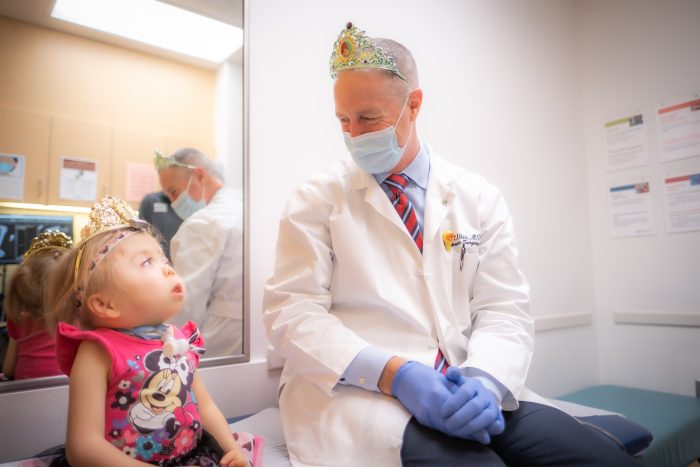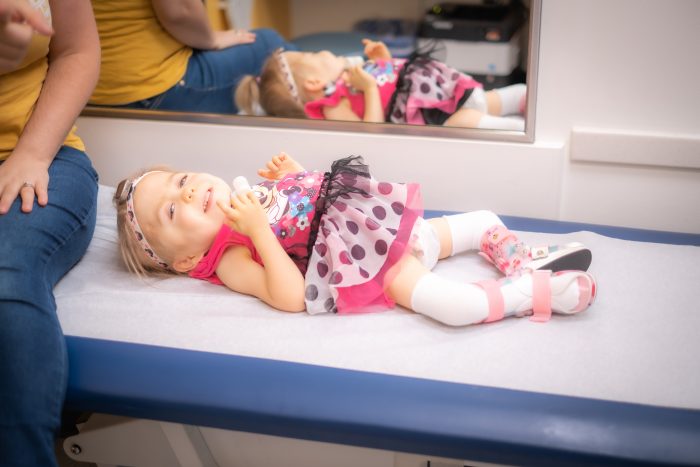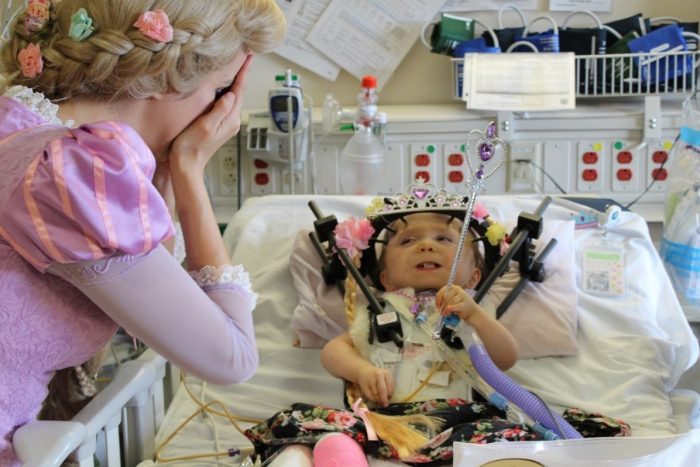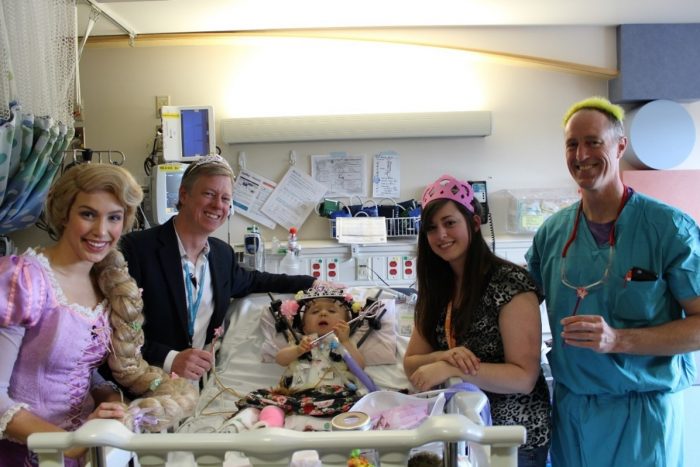
Dr. Klane White leads the Skeletal Health and Dysplasia Program at Seattle Children’s. He is an international expert in the care of children with mucopolysaccharidosis (MPS) and skeletal dysplasia, lecturing around the globe on the orthopedic management of these conditions. In addition to being the only pediatric orthopedic surgeon in the world to serve as principal investigator on phase 3 clinical trials for rare skeletal conditions, he serves on the medical advisory board of Little People of America, the scientific advisory board of the National MPS Society and is an executive founding member of the Skeletal Dysplasia Management Consortium. This story is one example of the compassionate care he and other members of Seattle Children’s Orthopedics and Sports Medicine Program provide to children every day.
On June 20, 2017, Emma Krall entered the world. Born at 31 weeks and weighing only 3 pounds and 12 ounces, she was immediately intubated and transported from Olympia, Washington, to Seattle Children’s for specialized medical care.
Emma was diagnosed with an incredibly rare and life-threatening condition called campomelic dysplasia, which affects the skeletal, respiratory and reproductive systems. According to Emma’s mother, Rachael Krall, there are only about 200 people with Emma’s condition alive in the world. People with campomelic dysplasia usually have short legs, dislocated hips, underdeveloped shoulder blades, 11 pairs of ribs instead of 12, bone abnormalities in the neck, and inward- and upward-turning feet (clubfeet). Like many people affected with this condition, Emma was born with female anatomy but male (XY) chromosomes.
A myriad of providers came in and out of Emma’s hospital room in those first few weeks, including otolaryngologists, geneticists, endocrinologists, urologists, neurologists and orthopedic specialists like White. The Krall family met with providers from nearly every specialty area at Seattle Children’s.
Emma spent the first eight months of her life at Seattle Children’s. Since her initial stay, she and her parents have routinely traveled to Seattle Children’s for countless surgeries and coordinated care of her complex medical needs.
For Emma and her family, Seattle Children’s is like a second home, and their medical team has become an extension of their family.
Celebrating milestones
Emma enjoys coming to the hospital. She uses American Sign Language to communicate. On the long car ride up the I-5 corridor she claps, points and signs as they pass landmarks along the way. Her appointments with White are always a positive experience, according to her mother. Emma lights up when she sees him, and her bright smile envelops a room. During her most recent appointment, White entered the room carrying a pink bag adorned with crowns and a large pink ribbon. Emma loves princesses, and this wasn’t the first time the two had celebrated Emma’s perseverance and resilience.

In May 2019, Emma underwent a major spinal surgery. She was in the hospital for more than a month as a halo-gravity traction device helped stabilize and straighten her spine. When she was discharged, her doctors, nurses and other healthcare providers arranged a special princess party, complete with wands, tiaras and a special guest – a Disney princess.
Throughout her hospital stay, Emma watched nearly every princess movie and hung brightly colored princess coloring pages on the walls of her hospital room. When she was finally able to leave, the send-off was fit for a princess. Her inspirational story was even covered by Good Morning America.

Growing, thriving and celebrating Emma
Today, Emma is 4 years old. She still loves princesses and continues to make tremendous progress.
“We’re so thankful for Seattle Children’s,” Rachael Krall said. “A lot of kids like Emma don’t make it. Seattle Children’s is why she’s doing so well. This is where we’re supposed to be.”
This year, they are hopeful Emma will walk. Rachael says they are looking forward to helping Emma take those first small steps. The procedure performed in August by White to help straighten her bowed legs was a big step forward to help achieve that goal.
“I’m extremely proud of how far she’s come,” Rachael said.
She knows if Emma puts her mind to something, she’ll accomplish it.

A parent’s perspective and a passion for skeletal health
As an orthopedic resident at the University of California San Diego, White and his wife welcomed their second child, a daughter named Susannah. A few weeks after she was born, White noticed a curve in her spine which led to the diagnosis of a rare genetic condition requiring specialized medical care 2,000 miles away. White found himself traveling between San Diego and Minneapolis to help care for his daughter while also juggling his budding medical career. The experience made him realize there was an unmet need for the care of children with rare skeletal disorders, as well as more research in the field. He was determined to do both. Driven to better understand his daughter’s condition, as well as his deep desire to help other children like her, he began the journey to building a robust skeletal health and dysplasia program committed to surgical expertise, compassionate care and innovative research.
“If it wasn’t for Susannah, I probably wouldn’t be where I am today,” White said.
Parenting a child with a rare and complex disease has given White a unique perspective. Not only does he provide specialized medical and surgical care to patients and families with skeletal dysplasia, he can empathize, truly understanding the nuances of their circumstances.
“I can relate to families who have children with complex needs,” White said. “I have a profound appreciation for what they are going through.”
Today, White continues to advocate for families around the world with rare skeletal conditions and helps to lead international clinical trials to provide hope, care and cures to patients and families. Seattle Children’s providers, led by White, also helped found the Skeletal Dysplasia Management Consortium, an international panel of experts who develop evidence-based guidelines for diagnosing and treating skeletal dysplasias.
Emma will continue to see White as she grows. From prenatal care though adulthood, the Skeletal Health and Dysplasia Program follows a child’s development and addresses each patient’s physical, social and psychological needs. Emma’s parents are looking forward to watching her take her first steps.
“We’re very grateful for Seattle Children’s and for Dr. White,” Rachael said. “He helped improve our daughter’s quality of life. He’s willing to do whatever it takes to make Emma smile. To make it all better, both medically and to make her happy. We’re so thankful for him.”
At Seattle Children’s, hope, care and cure is embedded into everything doctors, nurses and providers do for patients and families, and sometimes a smile – and a tiara – can be the best medicine.

